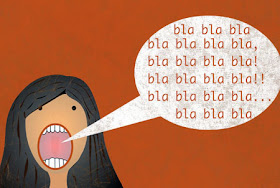Anyway, there were four things I had to remember from the speech wizard: "HOSE." Permit me to explain.
 I
started to develop that habit in 11th grade to be sure I could remember all
the chemical symbols. When I was in college, and then when I started to work as a professional--a professor, a columnist, a technical trainer--I made lists of words to remind me what should be on the final or what was up for the day. The words didn't have to be in the dictionary. My only job was remembering what they were.
I
started to develop that habit in 11th grade to be sure I could remember all
the chemical symbols. When I was in college, and then when I started to work as a professional--a professor, a columnist, a technical trainer--I made lists of words to remind me what should be on the final or what was up for the day. The words didn't have to be in the dictionary. My only job was remembering what they were. It was the same way in speech therapy. Thus, "HOSE."
The H stands for Hydration. Make sure your water consumption has been sufficient after you sleep. Your tissues are dehydrated after sleep, naps as well, so it is important to sustain the water in our system. Aside from flushing out waste and and keeping other body parts lubricated, you'll need more water to hydrate your voice if you sleep with your mouth open, if you're sleeping with air conditioner or heating, or if you are allergic to dust particles.
The Institute of Medicine (IOM) recommends about 91 ounces of water per day for women and 120 ounces for men. You may need more if you're exercising, so if you are, Gatorade is good for replenishing the electrolytes in your body, but if you have none available, good ol' water is fine, too, in the meantime. Most people struggle to even come close to IOM's recommendations, so you have to focus on drinking, even if you're not thirsty.
The O stands for Overarticulation and the S stands for Speak Slower. They're a package deal. Mostly all
dysarthria patients will need both overarticulation and a general slow down for best quality of speech because the mission of the dysarthria patients is to be understood.
Let's give it a test. If you really, really do both--overarticulate and slow your speech down, see how many people don't ask to say your request again. If I was to lay odds, I bet you don't have to repeat yourself at least 50% of the time.
When I was horrible in the beginning after I had my stroke, and I just started to speak after 5 weeks of having not, I was speaking so fast, not overarticulating at all. But 5 years later, when I learned from the speech therapist, it actually made a difference. Some people are bad listeners and they ask me to repeat myself, but I know it's not from articulation or fast speech.
 And finally, the E stands for speak on the Exhale. From creativespeechcentre.com (CPC), comes this: "[The students] have difficulty coordinating their breathing with their speaking; they
exhale first and then speak. As a result, they speak in a low volume and
they constrict their stomach, chest and throat muscles to create
speech, resulting in tense sounding speech.
And finally, the E stands for speak on the Exhale. From creativespeechcentre.com (CPC), comes this: "[The students] have difficulty coordinating their breathing with their speaking; they
exhale first and then speak. As a result, they speak in a low volume and
they constrict their stomach, chest and throat muscles to create
speech, resulting in tense sounding speech.
"What surprises them is that when we speak, we actually exhale, and that coordinating these two actions automatically results in louder, clearer speech. They learn to breathe deeply, then speak until much of their breath is exhaled and repeat the process."
The best explanation yet is our voice, not to get to the mumbo-jumbo, technical jargon used by speech therapists everywhere, is like a wind instrument, says CPC. When we exhale, our vocal cords vibrate our voice box and allow us to produced sounds, plain and simple.
Here's a simple test: try saying the word "well" on the inhale and again on the exhale. When you say it on the inhale, the word sounds strained, as if you are running out of air, which you are. When you say "well" while expelling your breath, it come out relaxed. The same applies to everything you say. Speaking on the exhale takes practice. But I think you'll find it easier once you get your breathing coordinated.
H-O-S-E. That's one that I'll remember always. And the speech therapist said the same 4 things. Share my method if you like. It's free, and free is almost always good.



Stroke can happen at any time at any age of life. The communication problem is very common in most stroke survivors. The people can't speak, write, or understand the language properly after stroke. They need proper rehabilitation to speak, write, and understand the language. LENA Therapy is the most advanced interactive speech therapy app that can help a stroke survivor to learn speaking after stroke easily
ReplyDelete